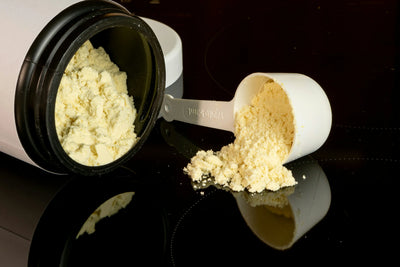Introduction
As a dog lover, have you ever been woken up late at night by your pup's anxious whimpering, or watched him huddle in a corner shivering during a thunderstorm, feeling both heartbroken and overwhelmed? That's when you may have heard that Melatonin - a natural hormone commonly used to regulate sleep and relieve anxiety - may help calm your little one.
Is Melatonin Safe for Puppies?
Facing your puppy's watery eyes, you will inevitably hesitate: is this stuff really safe for him? Don't worry, this article will take you deeper into the application of melatonin in puppies, talk about its benefits, risks and precautions when using it, so that you can have a clear mind and accompany your beloved dog to grow up healthily.

Is melatonin safe? The answer isn't that simple.
Melatonin is a natural hormone found in humans and animals that is primarily responsible for regulating sleep and the biological clock. In adult dogs, it has been widely used to relieve anxiety or improve sleep with proven results. However, puppies are different in that their bodies are still developing, their tiny livers and kidneys are not yet fully “grown”, and their ability to metabolize the drug is weaker than that of adult dogs. This means that puppies may be more sensitive to melatonin, which can be helpful if used correctly, but can cause problems if used incorrectly.
So, is melatonin safe for puppies? The short answer is: it's usually safe when used carefully under veterinary supervision, but it's by no means a “cure-all” that can be fed to just anyone. It is not intended to be used as a daily supplement, but more like a “first aid kit” for specific problems, such as severe anxiety or sleep disturbances. The key is to use it in the right way and to control the dosage, which we'll talk about later.
What Can It Do forMy Puppy?
Although it needs to be used with care, melatonin does have some real benefits for puppies. Here are a few common scenarios:
Relieving Anxiety
A puppy's world is full of “firsts” - going outside for the first time, hearing thunder for the first time, being home alone for the first time - all of which can make them nervous. Melatonin gently calms their nervous system, helping your little one stay calm during a trip, move, or storm. For example, if your pup gets scared and burrows under the bed when he hears fireworks, perhaps a small dose of melatonin will relax him.
Adjusting Sleep Rhythms
Some pups are like naughty children, refreshed at night but lethargic during the day. Melatonin can help them get back to a regular biological clock and make the nights a real time of rest. This is especially useful for puppies who are new to a new home and whose routine hasn't yet stabilized.
Improves Minor Skin Conditions
In case you didn't realize, melatonin can also cure skin problems! Seasonal shedding (alopecia), for example, works by regulating hormone levels, which can sometimes make your pup's coat grow back thick and smooth.
Doesn't that sound amazing? But don't be in a hurry to “prescribe” it for your dog - the benefits vary from dog to dog and it's not a substitute for daily companionship and training.
What are the Consequences of Using It Wrong?
Anything can go wrong, and melatonin is no exception. Although it has few side effects for most dogs, the sensitive nature of puppies makes these risks worth being aware of:
Drowsiness or Lack of Energy
When used too much, puppies may become lazy and just want to sleep all day, ignoring even their usual favorite toys. This is the most common reaction and usually gets better after discontinuing use.
Tummy Upset
Some puppies experience vomiting or diarrhea after taking melatonin, especially if fed on an empty stomach. What owner wouldn't be heartbroken to see it in distress?
Rapid Heartbeat
In a few cases, melatonin may spike your puppy's heart rate. If you notice him panting heavily, stop and find a vet.
Affects Future Reproduction
If your pup hasn't been spayed or neutered, prolonged use of melatonin may interfere with the development of his reproductive system. This is rare but should not be overlooked.
These side effects may sound a little scary, but with the right dosage and not too much time, most pups will be fine. The key is not to try it on your own, but to have professional guidance.
How Do You Set the Dose? Don't Go by Feel!
When it comes to dosage, it's a bit of a technicality. The dosage of melatonin has to be based on your puppy's weight and specific situation. Generally speaking, 0.1 mg per kilogram of body weight is a common starting point, but puppies are more delicate and may need to be dialed down a bit more. An example:
Small puppy weighing 3 kilograms: 0.3-0.5 milligrams
Puppy weighing 8kg: 0.8-1mg
However, these numbers are just a reference and you should always ask your vet for the real dose. After all, every dog's constitution is different, and it's easy to get into trouble by feeding it by feel. In case of overdose, it may cause epilepsy or extreme exhaustion in severe cases.
Five Practical Tips for Using Melatonin
To make melatonin a help rather than a nuisance, here are a few tips to jot down:
Talk to your vet first.
Before feeding, take your pup to the vet to talk about his health and see if he really needs melatonin. A professional opinion is always better than an “experience” post on the internet.
Don't overdo it.
Less is more, and stick to the dosage recommended by your vet. It's better to feed less than to risk giving more.
Pick the right product.
Some melatonin supplements on the market are for humans and may contain xylitol, a toxic ingredient for dogs. Be sure to choose a supplement that is designed for pets and has “for pets” written clearly on the package.
Keep an eye on the reaction.
The first time you use it, keep an eye on your puppy to see if he's uncomfortable. If he starts to vomit or wilt, stop using it and contact your veterinarian.
Use it short-term, don't get addicted.
Melatonin is not a long-term solution, and it's best to use it for a few days to solve a problem and then stop. Long-term dependence may make it less effective and also interfere with your pup's natural growth.
Try mixing melatonin into your dinner to help it sleep well without irritating its little tummy too much. Of course, if you take it for more runs and jumps during the day, it will naturally get sleepy at night, and you may not even need extra help.
In fact, many times a puppy's anxiety and sleep problems don't need to be solved by melatonin. A warm nest, a regular routine, a few favorite toys, and your company are often all it takes to put it at ease. Melatonin is just an aid, so if your little one is only occasionally fussy, it might be better to put a little more effort into playing with it.
But if the problem is really tough, such as persistent fear or staying up all night, your vet may recommend a short-term dose of melatonin, paired with some kind of training program. After all, who doesn't want their puppy to be happy and sleep well every day?
Overall, melatonin is usually safe for puppies, but safe is only as good as cautious. With the guidance of your veterinarian, the right dosage and timing, it could be a great way to help your puppy through a difficult time. But don't forget that your puppy's health depends on more than just supplements, it's your love and attention.
The next time your puppy is shivering on a stormy night, give him a hug and ask your veterinarian, “Is melatonin right for him?” With professional advice and a delicate heart, your dog is sure to get better and better.
Melatonin Dosage for Dogs: Safe Guidelines and Tips
When the thunder roars, your dog huddles in a corner shivering; or tosses and turns at night, making it difficult to sleep ...... These scenes are heartbreaking. Fortunately, Melatonin - a natural hormone - may be your right-hand man. Not only does it help dogs relieve anxiety and improve sleep, it even works wonders for certain skin problems. But before using it, it's crucial to know the proper dosage and precautions. Let's explore how to safely and effectively use melatonin for your dog!
Why Do Dogs Need Melatonin?
Imagine your dog panicking on a stormy night and hiding under the bed, refusing to come out; or maybe he's lethargic and has lost his appetite due to separation anxiety. All of these situations can stem from physical and psychological stress in your dog. Melatonin, as a natural hormone, can gently regulate your dog's biological clock, relieving stress and allowing him to regain his peace and tranquility. Not only that, but melatonin can also have an unexpected effect on little ones who shed due to seasonal changes.

Dosage Guide: Tailoring Your Medicine to Your Needs
Melatonin dosage is not one-size-fits-all; it needs to be finely tuned to your dog's weight and specific issues. Below is a weight-based dosage reference chart:
| Dog Weight (Pounds) | Melatonin Dosage (mg) | Usage Scenario |
|---|---|---|
| 10 pounds and under | 1 mg | Mild anxiety or sleep aid |
| 10 to 25 pounds | 1.5 to 2 mg | Moderate anxiety or hair loss treatment |
| 26 to 50 pounds | 3 to 5 mg | Severe anxiety or sleep issues |
| 51 to 100 pounds | 3 to 6 mg | Severe issues in large dogs |
| Over 100 pounds | 6 mg | Severe issues in giant dogs |
Tip: Melatonin is usually used no more than three times a day, with the exact frequency adjusted according to your dog's response and your veterinarian's recommendations. Remember, too much melatonin may cause excessive lethargy or other discomfort. For example, my 20-pound Corgi, Ball, slept well on the first dose of 1.5mg, but if I accidentally used 3mg, he was too lazy to move the next day.
Choosing the Right Melatonin Product
With the wide array of melatonin products on the market, how do you pick the safest and most appropriate one for your dog?
Avoid Xylitol: This is the top priority! Xylitol is highly toxic to dogs, make sure you choose a product that does not contain this ingredient.
For Pets: Melatonin for humans may contain additives that are harmful to dogs, so choose a product labeled “for pets”.
Quality is king: Choose a product that has been verified by a third party to ensure that the ingredients are pure and the dosage is accurate.
Variety of forms: Melatonin is available in tablets, capsules, liquids, sprays and more. If your dog resists swallowing tablets, try the liquid form, which is more palatable when mixed into food.
Warm tips: I once bought a pet-specific liquid melatonin for my ball, and put a few drops in his favorite chicken puree, which he ate happily, and I felt relieved.
Precautions for Using Melatonin
Before using melatonin, please make sure to keep the following points in mind to ensure your dog's safety:
Consult your veterinarian: This is the most important step! Your veterinarian will customize the dosage and use regimen based on your dog's age, health and specific issues.
Observe reactions: closely monitor your dog's reactions when using it for the first time. Common side effects include mild lethargy or stomach upset, which usually goes away after discontinuing use. If abnormalities occur, such as persistent vomiting or unusual behavior, contact your veterinarian immediately.
DRUG INTERACTIONS: Melatonin may interact with certain medications (e.g., blood pressure medications, anticoagulants). It is important to inform your veterinarian of any other medications your dog is taking before use.
Short-term use: Melatonin should not be used in large quantities over a long period of time as it may affect your dog's natural hormone levels.
Tip: When administering the drug, you can mix melatonin into your dog's favorite snacks to mask the taste of the drug and keep him happy to receive it. Ball especially likes it when I feed him pills wrapped in peanut butter and lick it clean every time.
Scenarios for Melatonin
Melatonin is not a cure-all, but it can make a significant difference in the following situations:
Anxiety and Stress: Whether it's a thunderstorm or fireworks, traveling or moving, melatonin can help your dog stay calm. Imagine gently stroking your dog's head on a stormy night, feeding him a melatonin, and watching him gradually relax and fall asleep without worry - what a cozy picture!
Sleep Problems: For dogs that suffer from insomnia due to environmental changes or physiological reasons, melatonin gently adjusts their biological clocks, returning peace to the night.
Skin problems: Certain types of hair loss, such as seasonal hair loss, melatonin can also help with hair regrowth.
Real life example: My friend Li's Labrador became anxious whenever it thundered and hid under the bed, refusing to come out. On the advice of his veterinarian, Xiao Li tried melatonin. After the first use, DouDou was able to lie peacefully in the nest in the sound of thunder, occasionally looking up at the window, anxiety greatly relieved. Xiao Li said she was relieved at that moment and felt that Doudou had something to fall back on.
While melatonin can bring many benefits to dogs, remember that it is only an aid. True healing can't happen without your companionship and love. Spending more time interacting with your dog, training, and building a sense of security is the long term solution. When you see your dog gradually become confident and happy under your care, the joy is irreplaceable by any medicine. This is the story of Ball and I - from the initial panic on the night of a thunderstorm to being able to sleep peacefully in my arms, the companionship along the way is more precious than melatonin.
Melatonin offers a gentle, safe way to help dogs cope with life's little challenges. However, please be sure to use it under the guidance of your veterinarian, following the correct dosage and precautions. May your dog grow up healthy and happy under your loving care, and share every heartwarming moment. After all, they are not only our pets, but also family members.
Using Melatonin for Dogs: Benefits, Dosage & Safety
Melatonin - a natural hormone - may be your right-hand man. Not only does it help dogs relieve stress and improve sleep, but it can also treat certain skin conditions. But before using it, it's vital to understand its benefits, proper dosage and safety. Let's explore how to use melatonin for your dog scientifically and lovingly!
Melatonin: Your Dog's Reassurance Pill and Groomer
Imagine your dog shivering under the bed after a thunderstorm, or losing his appetite due to separation anxiety, or suffering from a thinning coat. These are problems that melatonin may be able to help with.
Relieve Anxiety and Stress: Melatonin gently calms your dog's nervous system and reduces the production of stress hormones, allowing him to remain calm in stressful situations such as thunderstorms, traveling, or fireworks. Imagine the heartwarming image of your dog no longer panicking but lying quietly next to you as the fireworks go off!
Improve the quality of sleep: For those dogs who suffer from insomnia due to environmental changes or physiological reasons, melatonin can regulate their biological clocks, helping them fall asleep faster and sleep more soundly. My little corgi “Ball” had insomnia due to moving, but after trying melatonin, he finally slept through the night.
Supports cognitive function in older dogs: As dogs age, some may experience cognitive impairment in the form of confusion, irritability, etc. Melatonin is an antioxidant that can be used to support the cognitive function of older dogs. The antioxidant effects of melatonin slow down this process, keeping older dogs energized.
Relieves symptoms of Cushing's disease: Cushing's disease can lead to high cortisol levels in dogs, and melatonin can help regulate hormone levels and relieve related symptoms.
Promote hair growth: For dogs with thinning hair due to seasonal shedding or skin problems, melatonin can stimulate the hair follicles to bring back the shine. A friend's Labrador has regained a thick, beautiful coat as a result!
Dosage Guide: Customized and Precise Care
The dosage of melatonin is not set in stone, it needs to be adjusted according to your dog's weight and specific problems. Here is a reference table:
- Small dogs (10 pounds and under): 1 mg
- Medium dogs (10 to 25 pounds): 1.5 to 2 milligrams
- Large dogs (26 to 50 pounds): 3 to 5 milligrams
- Extra-large dogs (50 pounds and over): 5 to 6 milligrams
Tip: Melatonin should be used no more than three times a day; consult your veterinarian for exact frequency. Remember, too high a dose may cause side effects. For example, if Ball weighs 20 pounds, I give him 1.5 milligrams and it works, but if I accidentally use 3 milligrams, he will become lazy and unmoving.
Safety: Medicate Carefully and Watch Carefully
Melatonin is usually safe for dogs, but it's important to note the following points:
Avoid overdose: An overdose may lead to lethargy, diarrhea, vomiting, etc., and in severe cases, even cause seizures. Be sure to use the dosage strictly as recommended by your veterinarian.
Stay away from xylitol: xylitol is toxic to dogs, make sure to choose a product that does not contain this ingredient.
Consult your veterinarian: Before use, inform your veterinarian of your dog's health condition and the medication you are using to prevent interactions.
Observe reactions: When using for the first time, pay close attention to your dog's reactions. If there is any abnormality, discontinue use immediately and contact your veterinarian.
Warm Tip: I had purchased Melatonin for Pets for Balls, which is easier to feed in liquid form. Every time I mix it into his favorite chicken puree, he eats it happily and I feel relieved.

Although melatonin is good, please remember that it is only an aid. True healing cannot be achieved without your companionship and love. Spending more time interacting with your dog, training, and building a sense of security is the long term solution. When you see your dog gradually become confident and happy under your care, the joy is irreplaceable by any medicine. This is the story of Ball and I - from the initial panic on the night of a thunderstorm to being able to sleep peacefully in my arms, the companionship along the way is more precious than melatonin.
Melatonin offers a gentle, safe way to help dogs cope with life's little challenges. However, please be sure to use it under the guidance of your veterinarian, following the correct dosage and precautions. May your dog grow up healthy and happy under your loving care and share every heartwarming moment. After all, they are not only our pets, but also family members.





